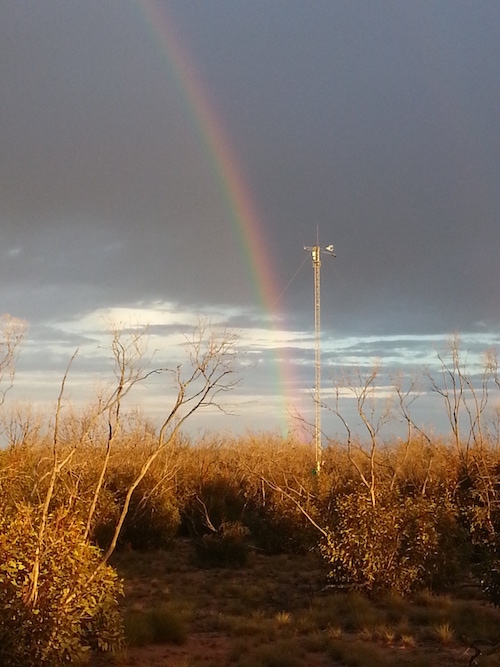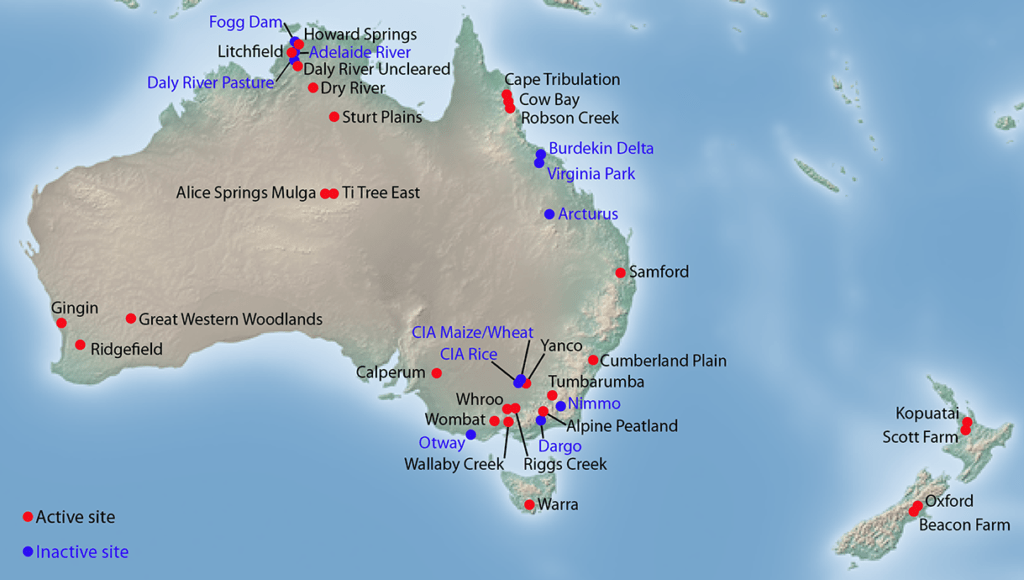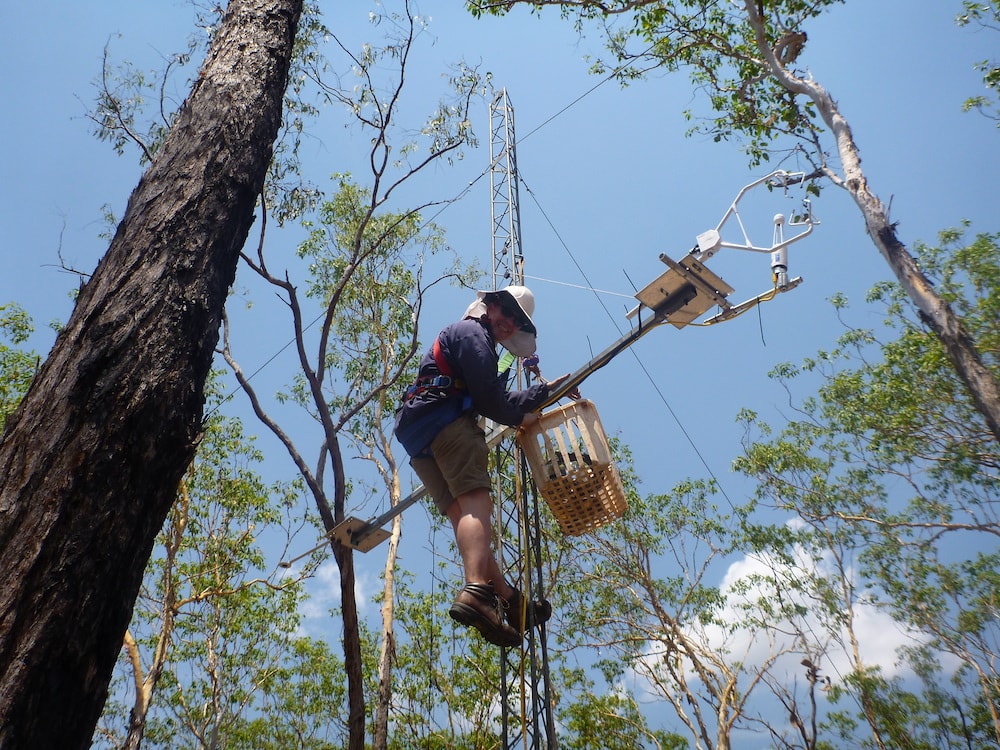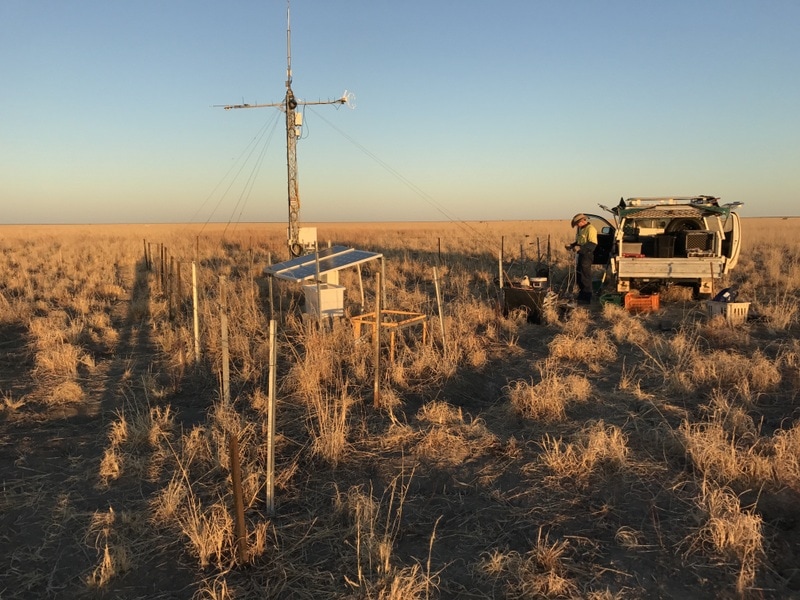This year the Australian and New Zealand eddy-covariance flux research community – OzFlux – is turning 20! To celebrate this milestone, and contribution to scientific discovery and advancement, the OzFlux community is coming together for a virtual conference to reflect on the past 20 years and present on the new wave of science that will lead OzFlux into the next 20 years.
July’s OzFlux conference promises something of interest to everyone with invited talks from international guests Prof. Dennis Baldocchi and Prof. Dario Papale, and sessions from a diverse range of Australian and New Zealand researchers, postdocs and students, and topics ranging from ecosystem measurements at the local scale to global scale syntheses and modelling.
16 – 17 July 2020 via zoom – Register
Vital data for understanding environmental change
OzFlux is a landscape research network spanning Australia and New Zealand that serves earth system science by providing measurements of carbon and water cycling in earth’s ecosystems. It also provides important validation data for models that predict weather, climate and ecosystem response to stress over daily, seasonal, annual and decadal timescales.
The OzFlux network was established by CSIRO’s Dr Ray Leuning (deceased) and its longest running sites at Howard Springs, Tumbarumba and Daintree were started 20 years ago. Over the past decade it has been strongly supported by NCRIS-enabled TERN ecosystem research infrastructure.
A key research goal of the OzFlux community is to provide high-temporal resolution data (i.e. half-hourly) on carbon, water and energy fluxes across the native and managed ecosystems of Australia and New Zealand. These data are vital for understanding how ecosystems respond to climate change and stress over time, and have been extremely valuable to the ecosystem processes and climate modelling community.

The flux tower at TERN’s Calperum Mallee SuperSite in South Australia

OzFlux sites
OzFlux outputs in high demand
OzFlux is a regional network and member of the global FLUXNET community providing vital information about unique Australian and New Zealand ecosystems to assessments at the global scale by submitting data to a global FLUXNET database. FLUXNET collates and processes flux data from participating networks around the globe about every seven years, with the most recent collection being in 2015 (known as ‘FLUXNET2015’).
OzFlux sites and investigators have contributed over 113 combined site years of data across 23 sites a significant portion of the total data (1500 combined site years) demonstrating the amazing contribution that is a testament to the quality of research infrastructure and research in Australia and New Zealand.
Not only has Australia and New Zealand punched well above its weight in the area of flux science, with pioneering contributions in developing the theory and applications of micrometeorology, OzFlux data are in huge demand by researchers all around the globe.
“Our Australian and New Zealand flux data is in massive demand, with most sites having over 1300 unique downloads each since 2015.”
Prof Jason Beringer, University of Western Australia and OzFlux Director
Many researchers recognise the utility of the OzFlux community’s measurements for carbon accounting, water cycle studies, agricultural management studies, disturbance impacts and climate and environmental change studies. The high demand for Australian and New Zealand data comes from the fact that our ecosystems and climate are unique across the globe.

OzFlux director Prof. Jason Beringer working on an understory flux tower at Howard Springs in the Northern Territory (credit: Caitlin Moore)
Conference details
If you would like to hear more about how OzFlux have been observing the breathing of terrestrial ecosystems across Australia and New Zealand, please register to join the 2020 OzFlux Virtual Conference.
16 – 17 July 2020 via zoom – Register here
Agenda
Day 1 (July 16)
TIME (AEST) | What | Who | Time (PDT, July 15) | Time (CEST) | Time (AWST) | Time (NZST) |
09:50 | Welcome and opening | Dr Beryl Morris (TERN Director) | 16:50 | 01:50 | 07:50 | 11:50 |
10:00 | Plenary: International contribution of OzFlux. How flux measurements have contributed to our understanding of Global Change Biology inc. long term data (40+20min) | Dennis Baldocchi (invited) | 17:00 | 02:00 | 08:00 | 12:00 |
11:00 | Celebration 20th anniversary (opening comments). Aussies and Kiwis, past OzFlux directors, Caitlin Moore (video), Jason Beringer (game) | Helen Cleugh (Chair) | 18:00 | 03:00 | 09:00 | 13:00 |
12:00 | Lunch | 19:00 | 04:00 | 10:00 | 14:00 | |
12:45 | Theme 1: Contributions to and future Integration of remote sensing | Alfredo Huete (Chair) | 19:45 | 04:45 | 10:45 | 14:45 |
13:30 | Break | 20:30 | 05:30 | 11:30 | 15:30 | |
13:45 | Theme 2: Contributions to and future Integration of modelling | Martin De Kauwe (Chair) | 20:45 | 05:45 | 11:45 | 15:45 |
15:00 | Break | 22:00 | 07:00 | 13:00 | 17:00 | |
15:15 | Theme 3: Contributions to and future Integration of Trace gases/agriculture | Johannes Laubach (Chair) | 22:15 | 07:15 | 13:15 | 17:15 |
16:00 | Virtual drinks, fireplace hangout | 23:00 | 08:00 | 14:00 | 18:00 |
Day 2 (July 17)
TIME (AEST) | What | Who | Time (PDT, July 16) | Time (CEST) | Time (AWST) | Time (NZST) |
10:45 | New technology (Licor/Campbell) | George Burba | 17:45 | 02:45 | 08:45 | 12:45 |
11:45 | Theme 4: New horizons (technical innovation like SIF) | Caitlin Moore (Chair) | 18:45 | 03:45 | 09:45 | 13:45 |
12:30 | Lunch | 19:30 | 04:30 | 10:30 | 14:30 | |
13:15 | Theme 5: Contributions to and future alpine/wetland integration of ecosystem processes | Mark Hovenden (Chair) | 20:15 | 05:15 | 11:15 | 15:15 |
14:00 | Break | 21:00 | 06:00 | 12:00 | 16:00 | |
14:15 | Theme 6: Contributions to and future Integration of decadal processes | James Cleverly (Chair) | 21:15 | 06:15 | 12:15 | 16:15 |
15:00 | Integrating Critical Zone processes | Sally Thompson | 22:00 | 07:00 | 13:00 | 17:00 |
15:15 | Break | 22:15 | 07:15 | 13:15 | 17:15 | |
15:45 | Synthesis (Lessons learnt) | Theme chairs plus Helen, James and Jason | 22:45 | 07:45 | 13:45 | 17:45 |
16:30 | Plenary: Data futures (40+20min) | Dario Papale (invited) | 23:30 | 08:30 | 14:30 | 18:30 |
17:30 | Conference final remarks and close (10 minutes) | Jason and David C | 00:30 | 09:30 | 15:30 | 19:30 |







